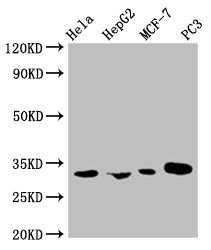The AGBL2 monoclonal antibody is generated using hybridoma technology. Specifically, mice were immunized with the recombinant human cytosolic carboxypeptidase 2 protein (10-270aa), and B cells were extracted from their spleens. These B cells were then fused with myeloma cells to create hybridomas, from which AGBL2 antibody-producing hybridomas were selected. The selected hybridomas were cultured in the mouse abdominal cavity, and the AGBL2 monoclonal antibodies were purified from mouse ascites using affinity chromatography. The purified antibody is a mouse monoclonal antibody that reacts specifically with human AGBL2 protein in ELISA and WB applications.
AGBL2, also called cytosolic carboxypeptidase 2 (CCP2), is a member of the AGBL protein family that plays a crucial role in regulating cell proliferation and apoptosis. AGBL2 has been implicated in various cellular processes such as protein degradation, signal transduction, and cytoskeletal reorganization. It also plays a role in the regulation of autophagy and the stability of the microtubule cytoskeleton.






